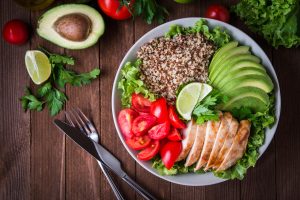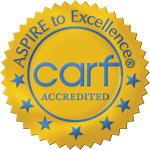This post on nutrition in recovery was written by our guest columnist Denise Barnett, RD, LD, CDE, who is a Certified Life Coach at Diabetes & Nutrition Management of Bardstown.
Nutrition plays an important role in recovery from substance abuse. The food and beverages one chooses to eat and drink has an impact on overall health. When someone enters recovery after an active addiction, they are often malnourished and broken, due to the inadequacy of the food they might have been eating—and often the lack of money to buy good food. The depth of this problem can sometimes be overlooked, because the deficiencies are not always easily visible and recognized by others. Most individuals just starting recovery are lacking in micro- and macronutrients. The complexity of these concerns varies between individuals, depending on the substances the person has used.
Many factors lead to nutritional problems during and after an addiction
Restoring health, both to the body and mind, is key to long-term recovery. The scale of nutritional concerns can range from over-consumption of calories to under-consumption—which is why body sizes for those who have struggled with addiction can vary greatly. Many nutrients are often found to be deficient and the body’s stores may be found to be depleted. Nutritional decline can be related to the actual substance abuse. Additionally, poor nutrition may likely be a factor in one’s struggle with substance use. Health problems such as diabetes, heart disease, high blood pressure, and liver disease just compound the complexity of a person’s health and nutrition needs.
So what defines good nutrition in recovery?
Each person needs to be assessed individually, and a plan should be implemented based on the results. Generally, a person in recovery should focus on a balance of the nutrients they consume. Using a guide that is simple, such as the plate method, works for most individuals. Giving consideration to when, what, and how much one eats is also important for good nutrition in recovery.
So, using the plate method, let’s look at how each food group contributes to good nutrition in recovery:
- Protein is a macronutrient that helps the body heal and build hormones, antibodies, and neurotransmitters. Choosing lean sources is best. Examples of lean sources include skinless poultry, fish, lean pork and beef, low-fat cheese, cottage cheese, eggs/ egg substitute, dried legumes, and tofu. The plate method, for example, allows protein to make up one-fourth of the plate.
- Fat is a macronutrient that provides many calories and essential fatty acids. Sources of fat include oils, margarines, nuts, seeds, and olives. Fats should be used in limited portions. Generally, it is recommended to aim for 6–8 teaspoons per day.
- Carbohydrates are our main source of energy. Carbs come from several food groups, including starches/ grains, fruits, vegetables, and dairy products. Starches and grains that are known to be the most healthful are those that are higher in fiber. This group is limited to one quarter of a healthy plate as well (like protein above). Fruits and vegetables make up the remaining half of the plate. It is recommended to aim for colorful fruits and vegetables for the most micronutrients and antioxidants. Micronutrients are important because they include vitamins and minerals that most people recovering from addiction may be lacking. Dairy foods should be low fat, and 8 ounces of dairy is a typical meal portion.
By including all these food groups and using a simple nutrition planning method like the plate method, those in recovery will have the best chance at restoring their nutrient deficiencies. These include iron, vitamin C, vitamin D, and the B vitamins, among many others. Often, people will benefit from vitamin and mineral supplements as well.
Water—the missing ingredient for good nutrition in recovery
 Lastly, one cannot overlook the value of drinking water while in recovery. Hydration concerns are a big deal for those seeking recovery from drugs or alcohol. It is common for detoxification from drugs or alcohol to result in increased vomiting and diarrhea, which means a loss of fluids. Because adequate fluids and water are essential to normal function, it’s vital to stay hydrated during this crucial time for the body.
Lastly, one cannot overlook the value of drinking water while in recovery. Hydration concerns are a big deal for those seeking recovery from drugs or alcohol. It is common for detoxification from drugs or alcohol to result in increased vomiting and diarrhea, which means a loss of fluids. Because adequate fluids and water are essential to normal function, it’s vital to stay hydrated during this crucial time for the body.
Although recovery takes time, good nutrition does help those who struggle to recover from substance use. Getting good nutrition in recovery is one important factor in helping the body heal from the damage of addiction.


